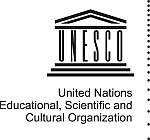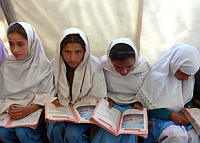UNESCO: de Verenigde Naties Organisatie voor Onderwijs, Wetenschappen en Cultuur (in het Engels)
The United Nations Educational, Scientific and Cultural Organization (UNESCO)

The United Nations Educational, Scientific and Cultural Organization (UNESCO) was founded on 16 November 1945.
The purpose of the Organization is to contribute to peace and security by promoting collaboration among the nations through education, science and culture in order to further universal respect for justice, for the rule of law and for the human rights and fundamental freedoms which are affirmed for the peoples of the world, without distinction of race, sex, language or religion, by the Charter of the United Nations.
Article I.1 of the UNESCO Constitution

Through its strategies and activities, UNESCO is actively contributing to the achievement of the Development Goals of the United Nations Millennium Declaration by 2015, especially those aiming to:
- eradicate extreme poverty and hunger
- achieve universal primary education
- eliminate gender disparity and strengthen the role of women
- combat HIV/AIDS, malaria and other diseases
- ensure environmental sustainability
See also www.un.org/millenniumgoals/
- Education
- Natural Sciences
- Social and Human Sciences
- Culture
- Communication and Information
Education

Since its creation in 1945, UNESCO has worked to improve education worldwide through technical advice, standard setting, innovative projects, capacity-building and networking. Education for All (EFA) by 2015 guides UNESCO's action in the field of education and indeed, in an intersectoral manner, throughout all its fields of competence.
UNESCO's educational priorities:
- Basic education for all, with special attention being given to literacy, HIV/AIDS prevention education and teacher training in sub-Saharan Africa
- Secondary education, including technical and vocational education and training as well as science and technology education
- Promoting quality education, with special reference to values education and teacher training
- Higher education
Natural Sciences
Since its inception, UNESCO has developed several international programmes to better assess and manage the Earth's resources. The Organization also helps to reinforce the capacities of developing countries in the sciences, engineering and technology.

UNESCO's priorities in the field of Natural Sciences:
- Water and associated eco-systems
- Oceans
- Capacity-building in the basic and engineering sciences, the formulation of science policies and the promotion of a culture of maintenance
- Promoting the application of science, engineering and appropriate technologies for sustainable development, natural resource use and management, disaster preparedness and alleviation and renewable sources of energy
Social and Human Sciences
The social and human sciences have a vital role to play in helping to understand and interpret the social, cultural and economic environment. They provide research, identify and analyse trends, propose paths of action.
UNESCO's priorities in the field of Social and Human Sciences:
- Ethics of science and technology, with emphasis on bioethics
- Promotion of human rights and the fight against all forms of discrimination, racism, xenophobia and related intolerance through activities in UNESCO's field of competence
- Foresight, philosophy, human sciences, democracy and the enhancement of human security
- Management of social transformation
Culture

Preserving and respecting the specificity of each culture, while ensuring that it preserves and respects the specificities of another culture, and involving it in an approach that bring them together and extends beyond them in a more interactive and interdependent world, is the challenge which must be met by the international community and, on its behalf, by UNESCO and its partners.
UNESCO's cultural priorities:
- Promoting cultural diversity, with special emphasis on the tangible and intangible heritage
- Cultural policies as well as intercultural and interfaith dialogue and understanding
- Cultural industries and artistic expressions
Communication and Information

Communication and Information programmes are rooted in UNESCO's Constitution, which requires the Organization to promote the "free flow of ideas by word and image". The main objective for UNESCO is to build a knowledge society based on the sharing of knowledge and incorporating all the socio-cultural and ethical dimensions of sustainable development.
UNESCO's priorities in the field of Communication and Information:
- Empowering people through access to information and knowledge with special emphasis on freedom of expression
- Promoting communication development
- Advancing the use of ICTs for education, science and culture
How is the work of UNESCO financed?
UNESCO's regular two-year budget is financed by Member States through assessed contributions. The regular budget for 2008-2009 is US$ 631 million. UNESCO also benefits from substantial extra-budgetary funding to strengthen its programmes, especially in the field, and to increase its outreach activities. In 2004, these extra-budgetary resources amounted to some US$ 322 million.

Get involved ...
Join one of the 3,600 UNESCO Clubs, Centres and Associations in more than 80 countries.
UNESCO Clubs, Centres and Associations
Contact one of approximately 8,000 Associated Schools in 175 countries.
UNESCO's Associated Schools Project Network (ASPnet)
